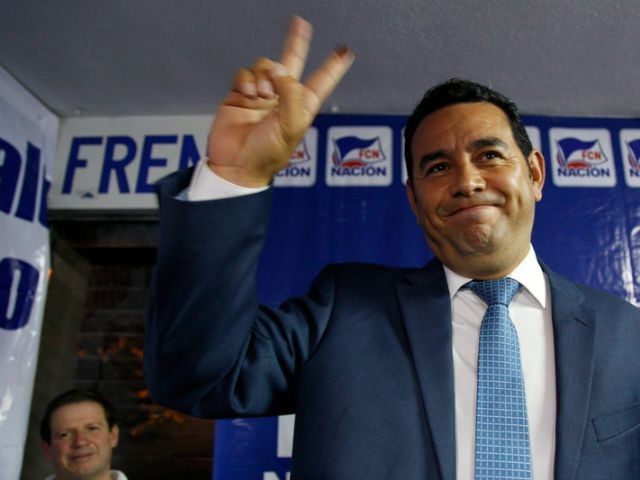“I have made you laugh for 20 years, and as president I promise I won’t make you cry,” says Jimmy Morales, the man winning first place in Guatemala’s first round of presidential elections. Morales, a comedian known for his cowboy alter ego Neto, will face a runoff opponent in October.
Morales leads in the first round of elections following the resignation and arrest of President Otto Pérez, indicted on a number of bribery and corruption charges. He leads only slightly, though; as The Wall Street Journal notes, Morales led the polls, after 64% of votes were counted, with 27% of the vote. His runoff opponent-to-be, businessman Manuel Baldizón, secured 18% of the vote. If no candidate reaches 50%, the nation is required to hold a runoff, which is scheduled for October 25.
Morales was a surprise winner in this election, having no public office experience and famed for playing the character of Neto, a confused cowboy, in sketches with his brother, Sammy. (Sammy played his brother “Nito” in the series.) His stump speeches, observers note, were light on policy and heavy on personality. “People ask me if I am Nito or Neto,” he often said. “I’m Neto: I’m not pretty, but I’m flirty.” In his videos, Morales appears to play a peasant with little social grace, who continually finds himself in absurd situations.
To the extent that Morales has delivered specific policy, opponents have labeled it bizarre, such as a call to pay for a smart phone for every child in Guatemala. He adopted as his slogan “Not Corrupt, Not a Thief,” and lists his platform issues on his website as “Fear of God,” “Family First,” “Honor,” “Justice Must Prevail,” “Service Above Self,” “Honesty,” and “Humility Is a Virtue.”
Morales is considered a right-wing politician, running on the platform of the National Convergence Front (FCN-Nación) party. Baldizón, his runoff opponent, is also considered right-wing, though a businessman and member of a wealthier class. Morales’ platform focuses on decentralizing the power of the government and giving local politicians more leeway in how they wish to conduct government business; Baldizón ran on a platform of combatting tax evasion and imposing austerity measures.
The Wall Street Journal notes particularly astonishing the wide margin of difference between the two candidates’ expenditures: Baldizón spent $5.3 million on campaigning, while Morales spent about $480,000. In Guatemala, it is not legally required for candidates to publicly disclose where their campaign money comes from, leading many to suspect that the wealthiest candidates are corrupt. Baldizón did face a corruption scandal; his running mate was accused of having ties to shady international organizations in the course of campaigning.
As for Morales, he has faced criticism regarding support from the military. The party launched a 2008 campaign with money from a number of retired military leaders accused by some NGOs of human rights violations. The Morales campaign was quick to respond to accusations that he, too, was a product of such support. “The FCN Nación Party is not made up of ex-soldiers,” Morales’ website explains. “Since 2013, when I was named Secretary General of the party, 99% of the leadership was replaced by people I trust, without political experience, but with the desire and capability to construct a happy and immortal Guatemala,” he writes.
The winner of the October 25 runoff vote will replace acting President Alejandro Aguirre, who took power after Otto Pérez was arrested for corruption. Pérez was stripped of executive immunity and then stepped down, being held under arrest as soon as he lost immunity. He is facing official charges of “fraud, illicit association, and corruption.”

COMMENTS
Please let us know if you're having issues with commenting.